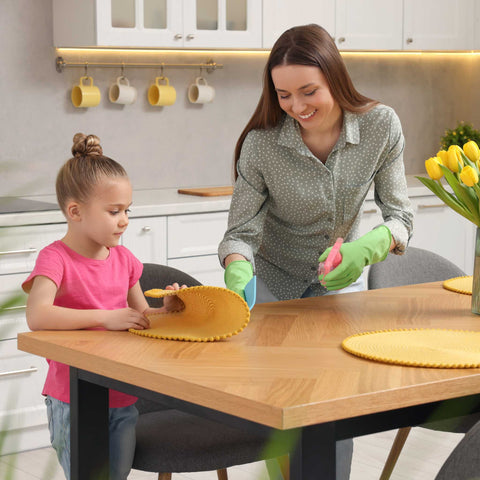
Turning Spring Cleaning into a Game: Engaging Kids in Household Chores
Contents
Last 10 Articles
- 5 Proven Tips to Help Your Picky Eater Love Veggies
- This Is Why Unstructured Playtime Is Vital for Your Child’s Development
- Dog Food Hacks for Picky Eaters: Healthy Tips to Ensure They Love Mealtime
- When to Seek Medical Attention: Recognizing the Signs in Sick Kids*
- Kid-Friendly Veggie Smoothies: Delicious Recipes Even Picky Eaters Can’t Resist
- Sleeping Through the Night: Expert Tips That Will Make Parents and Kids Happier
- How Veggie Powders Fill Nutritional Gaps: The Essential Guide for Parents
- Navigating the New Challenges of Parenting Elderly Parents with Compassion
- Quick & Healthy Breakfast Ideas That Will Make Your Mornings Easier
- Why You Should Adopt These Tantrum Taming Techniques
Transform Chores into Cheerful Play
Why Involve Kids in Household Chores?
Have you ever wondered why it’s important to get your little ones involved in household chores? Well, not only does it help them develop essential life skills like responsibility and self-discipline, but it also fosters a spirit of teamwork within your family. Engaging kids in chores from a young age encourages a healthy work ethic that blooms well into adulthood.
Making Chores Fun: Game On!
Now, the real magic happens when we turn these everyday tasks into exciting games. Who says cleaning has to be dull? By gamifying chores, we spark joy and enthusiasm in our children, transforming potential groans into giggles.
Imagine your morning cleanup turning into a treasure hunt or your laundry sorting becoming a color-matching game. This approach not only lightens your load but also turns mundane activities into memorable family moments.
Join us as we dive into innovative ways to make spring cleaning a delightful adventure for your entire family, ensuring that your little helpers are eager to participate and learn. Get ready to sweep away the old and play in the new!
Understanding the Benefits of Chores for Kids
Developmental Benefits of Chores
Chores are not just about keeping your home tidy; they are a cornerstone in the developmental journey of young ones. Engaging children in tasks like sorting laundry or setting the table teaches them responsibility and boosts their self-confidence. Plus, these activities are great for developing fine motor skills as they navigate the intricacies of folding, sorting, and organizing.
Emotional and Social Rewards
Beyond the physical tasks, chores have a profound impact on the emotional and social well-being of children. When kids contribute to the household, it strengthens family bonds and enhances their sense of belonging and accomplishment.
Participating in chores also instills a feeling of competence and pride, fostering a positive mood and cooperative spirit within the home.
By incorporating chores into your children's daily routine, you’re not just keeping your house in order—you’re building the foundation for responsible, confident adults who understand the value of work and family.
Preparing for Spring Cleaning
Creating a Spring Cleaning Checklist
Dive into spring cleaning by crafting a checklist that caters to every family member, tailored by age and ability. For the littlest helpers, simple tasks like picking up toys or dusting low shelves are perfect, while older children can tackle more complex jobs like vacuuming or wiping down surfaces. This approach ensures everyone knows what they’re responsible for and can see their contributions to the family’s efforts.
Setting Clear Goals and Expectations
Clarity is key when engaging kids in spring cleaning. Start by explaining the tasks clearly and why they’re important—not just for cleanliness but for working together as a family.
Setting achievable goals and acknowledging each step they complete fosters a sense of accomplishment and keeps motivation high. This transparency helps children understand what is expected, allowing them to approach their chores with confidence and enthusiasm.
By preparing thoughtfully for spring cleaning with a detailed checklist and clear goals, you set the stage for a productive and engaging day. This preparation not only promotes a clean home but also teaches valuable life skills, making the experience rewarding for everyone involved.
Designing a Kid-Friendly Chore Chart

Introduction to Chore Charts
Chore charts are a fantastic visual tool that helps organize household tasks in a fun and engaging way. By clearly outlining who is responsible for what chore and when it's due, these charts encourage accountability and independence in children, making chores feel less like work and more like a part of daily play.
How to Make a Chore Chart
Creating a chore chart is as easy as pie! Start with a large piece of poster board or a dry-erase board if you want something reusable. Gather some markers, stickers for decoration, and magnets if you’re using a magnetic board. Write down each chore clearly, and assign them to specific days of the week. Make sure to involve your kids in this process, so they feel a sense of ownership over the chart and their responsibilities.
Chore Chart Ideas
Tailor your chore charts to fit the ages and abilities of your children. For younger kids, use pictures or icons next to simple words to help them understand their tasks. Older children might appreciate a more detailed chart with additional responsibilities and the chance to earn rewards. You can even create themed chore charts, like a pirate map or treasure hunt, to spur their imagination and excitement about completing their chores.
By integrating chore charts into your family routine, you not only teach your children about the importance of responsibility and teamwork but also make the process enjoyable. This tool can transform daily chores into a delightful part of your kids' everyday adventures, fostering both personal growth and a tidy home.
Age Appropriate Chores for Kids

Chores for Younger Children (Ages 3-6)
For the little ones, chores should be about fun and play. Think small, manageable tasks like picking up toys, feeding a pet, or helping to set the table.
Use colorful, picture-based chore charts to keep them interested, and always accompany chores with lots of cheer and encouragement. Making a game out of these activities can keep their enthusiasm high!
Chores for Older Children (Ages 7-12)
As children grow, their capacity for responsibility does too. Suitable chores for this age group might include vacuuming, taking out the trash, or helping with meal prep.
These tasks help develop a sense of responsibility and basic life skills. Encourage older children by setting incremental goals and perhaps rewarding them with small privileges or allowances for a job well done.
Chores for Teens
Teenagers are ready for advanced chores that prepare them for adulthood. Consider assigning them the responsibility of managing the family laundry, cooking certain meals during the week, or overseeing younger siblings' chore performance.
These responsibilities not only boost their confidence but also teach critical management and organizational skills. Discuss these chores as contributions that are valued and crucial to the family, linking them to the independence and autonomy that teens crave.
Tailoring chores to fit the developmental stages of your children not only optimizes their success but also helps instill a lifelong appreciation for teamwork and personal responsibility. By engaging kids with age-appropriate tasks, you empower them to grow into capable, confident adults.
Gamifying Household Chores

Creating Fun and Engaging Games
Transforming chore time into game time can skyrocket engagement and make cleaning a blast! For instance, chore bingo can turn mundane tasks into a fun challenge as kids complete a row of tasks to win. Or, set up a treasure hunt where each completed chore reveals a clue to the next one, leading to a small reward at the end. This approach keeps the energy high and the grumbles low.
Rewards and Incentives
While it’s great to keep kids motivated, it’s important to balance rewards. Non-material incentives, like earning extra bedtime stories, choosing a family movie, or having an extended playdate, can be highly effective. These rewards encourage kids to associate positive feelings with chores without expecting material returns every time.
Discuss and agree on the rewards together, which can also teach them about negotiation and fairness.
By making chores fun and rewarding, you create a positive and productive atmosphere around housework. This not only makes your home cleaner but also instills a sense of teamwork and accomplishment in your children, turning necessary tasks into enjoyable family activities.
Implementing Technology in Chores
Using Apps and Digital Tools
In the digital age, chore tracking has never been easier! Apps like ChoreMonster or OurHome offer fun, interactive ways to manage chore charts and track progress. These tools not only keep chores organized but also add a layer of excitement for kids as they earn points or rewards digitally. This can be especially appealing to tech-savvy children who enjoy gadgets and apps.
Interactive Learning Tools
Chores don't have to be dull! Interactive learning tools can turn chore education into a fun activity. For example, using smart home devices like voice assistants to remind kids of their tasks or interactive websites that teach children how to complete certain chores properly can be a game-changer. These tools make learning new tasks engaging and accessible, keeping children interested and eager to participate.
By integrating technology into household chore routines, you not only streamline the process but also make it more appealing to children. This approach not only helps in teaching responsibility and organizational skills but also aligns with the tech-oriented interests of today's youth, making everyday tasks feel like a fun, interactive experience.
Tips for Maintaining Momentum
Consistency and Routine
Sticking to a regular schedule is the backbone of chore management success. Establishing a consistent routine helps embed chores into everyday life, making them less of a battle and more of a habit. By setting specific days and times for different tasks, children learn to anticipate what is expected of them, reducing confusion and the need for constant reminders.
Dealing with Resistance
Encountering resistance is a normal part of introducing children to chores, but don't let it derail your efforts. When children express a lack of interest or refuse to participate, it's crucial to understand the underlying reasons.
Are the chores too difficult, or perhaps they're perceived as boring? Address these issues by adjusting the tasks to better suit their abilities or by infusing more fun into the process. Consistent, calm discussions about the importance of contribution and teamwork can also help children feel more invested in the tasks at hand.
Maintaining momentum in chore routines requires a blend of firmness and flexibility. By staying consistent with routines and being responsive to your children's feelings and challenges, you can foster a positive, cooperative environment where chores become a regular and expected part of daily life.

Conclusion
The Joy of Chores
As we wrap up, let's remember that transforming chores into fun activities isn't just about keeping the house tidy; it's about teaching valuable life skills in an engaging way. Making chores enjoyable helps children develop a positive attitude towards responsibilities and enhances their ability to handle tasks with enthusiasm and creativity.
Building Foundations for the Future
By involving children in household chores and turning them into a game, we lay the groundwork for strong work ethics, teamwork, and self-reliance. These experiences are crucial as they teach children about collaboration, perseverance, and the satisfaction of a job well done.
Moreover, these fun-filled activities strengthen family bonds and create cherished memories that last a lifetime.
Embrace the opportunity to make household chores a rewarding and enjoyable part of your family’s routine, and watch as your children flourish into capable, confident individuals. Here’s to making every sweep, scrub, and sort a step towards growth and happiness!
Join the Conversation
Ready to transform chore time into fun time? We encourage you to try out the strategies we've outlined and see just how engaging and enjoyable chores can be for your kids. Once you do, we’d love to hear about your experiences! Share your stories in the comments below or on our social media pages.
Share Your Ideas
Do you have unique tips or creative games that have worked for your family? We're always on the lookout for fresh and innovative ways to make household chores appealing to kids. Drop us a line or post a comment with your suggestions and help other parents turn their chore routines into exciting adventures.
Let's build a community where chores mean laughter and learning, and where every task becomes a chance for our children to grow and shine. Your insights could inspire families everywhere to look at spring cleaning in a whole new light!
Leave your comments below; we love to hear from you! And don't forget to follow Easy Peasie for more veggie info and convo on YouTube, Facebook, and Instagram! ~ThePeas





